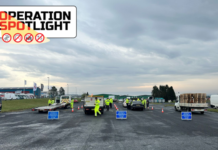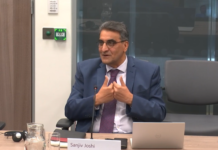The Government has claimed that it is “on track to reach its target to protect 30% of UK land and sea for nature 2030”, but green groups reveal today that the department responsible cannot provide any evidence to back-up these assertions.
The 30×30 target is a leading international commitment that the UK spear-headed at COP-15. In reaction to a recent report from Wildlife and Countryside Link on the lack of 30×30 progress from the Westminster Government, which estimated just 3.11% of land and up to 8% of sea are effectively protected for nature in England, Defra stated: “The government is on track to deliver on our commitment to protect 30 percent of land and of sea by 2030.”
Yet in response to a Freedom of Information request to see any assessments, evidence or policy papers detailing progress towards the 30×30 target, Defra could provide nothing. [1] There is recent clear scientific evidence that nature in the UK in fact continues to decline, despite Government’s promises to put nature on a path to recovery by 2030 and in the face of urgent calls from environmental leaders and MPs constituents for greater action.
Dr Richard Benwell, CEO of Wildlife and Countryside Link, said: “The Government is making big claims on its achievements for nature’s recovery that simply don’t hold up to scrutiny. Given that the 30×30 target is a critical milestone for improving nature it is disappointing, to say the least, that Government is not tracking its progress and can provide no policy route for how the target will be met by the deadline. Coming in the wake of the worrying findings from the State of Nature report and the Government’s volte face on climate action, the sirens sounding for the nature emergency have never been louder. It is vital that all political parties commit to a rapid programme of investment and expansion for important wildlife habitats and protected sites.”
Elliot Chapman-Jones, Head of Public Affairs at The Wildlife Trusts, said: “The Government is not only not ‘on track’ to its 30×30 target it seems to have got lost in the woods with no compass or map to guide its way. The impacts of the nature and climate emergencies are clear for all to see – fewer birds in our skies, fish in the sea, bees on our crops, and more extreme drought and flooding. Yet our Government is overclaiming progress on its nature promises and backtracking on related commitments like Net Zero. We need political leaders who will shoot for the moon in tackling the existential challenges we face, not bury their heads in the sand. That’s why we want to see ambitious moves for nature in every party’s election commitments.”
Rosie Hails, Nature & Science Director at the National Trust: “When the government committed to the 30×30 goal they underlined the urgency, saying that ‘we cannot afford dither and delay because biodiversity loss is happening today and it is happening at a frightening rate’. It’s therefore deeply worrying that three years later the Government is unable to provide robust evidence about progress towards the 30×30 goal. While Defra have convened an expert group of biodiversity scientists to provide advice, what’s urgently needed is a cross-department roadmap which clearly sets out how we achieve nature’s renewal, recognising that all parts of government have a role to play in reversing this alarming and continuing decline.”
Matt Shardlow, CEO of Buglife, said: “In 2020 the Government committed to increase by 10 times the land area of protected wildlife habitat in England by 2030 – boosting the area to 30% from the current 3%. We are nearly a third of the way to the deadline and there has been no project or funding announced to complete the protected sites series, or to otherwise make the significant progress required. It takes years to designate SSSIs and put in management measures to get existing protected sites into good condition. If there is no urgent announcement of a fully resourced programme for implementation in 2024 then this target will be impossible to reach.”
See additional quotes from the Rivers Trust, Campaign for National Parks, Marine Conservation Society and WWT (Wildfowl & Wetlands Trust) in the notes to editors. [2]
Just a week ago the ‘State of Nature’ report, a comprehensive assessment of the state of UK nature habitats and species, detailed that: 1 in 6 UK wildlife species are at risk of extinction; there has been an average 19% decline in the abundance of UK wildlife in the last 50 years; and only one in seven of the UK’s important habitats for wildlife are in good condition, including only 7% of woodland and 25% of peatlands.
In response to the latest State of Nature report, NGOs across England united on 28 September and gathered at DEFRA offices in a peaceful protest organised by Chris Packham, to demonstrate support for urgent action to restore nature.
There is also high public concern about the lack of action for nature. YouGov research for the Nature 2030 campaign in July revealed that only around 1 in 10 Brits think that the Government is performing well in key environmental areas. More than half of Brits (53%) say the Government is not doing or spending enough on environmental issues and only a quarter (26%) saying it is doing enough or too much.
Measures that would help restore our protected nature sites, towards achieving 30×30, are also strongly popular with Brits widely supporting the following potential measures:
- stronger protections and increased funding for publicly owned nature sites (78% of Brits would support this)
- creation of new publicly owned nature spaces (76% support)
- granting more nature spaces legal protection (77% support)
- and ensuring National Parks and AONBs have nature recovery as a key goal (75% support).
Over 100 nature and health organisations have backed the Nature 2030 campaign – calling for 5 key measures for nature that all political parties should be committing to as we head towards the 2030 target and a looming general election:
- A pay rise for nature and farmers: Doubling the nature-friendly farming budget to £6bn pay for ambitious farm improvements and large-scale nature restoration
- Making polluters pay: Putting a Nature Recovery Obligation in law, requiring polluting big businesses to deliver environmental improvement plans, and funding to counter the damage they cause to nature
- More space for nature by 2030: A 30×30 rapid delivery programme restoring protected sites and landscapes and creating a Public Nature Estate to fulfil the promise to protect 30% of the land and sea for nature, and deliver more nature in all communities.
- Delivering the green jobs we need: A National Nature Service, delivering wide scale habitat restoration and creating thousands of green jobs
- A Right to a Healthy Environment: establishing a human right to clean air and water and access to nature, building nature into decision making, enabling people to hold decision makers to account and driving changes that will recover nature and improve public health.
The charities are also urging members of the public to add their name to demands for stronger nature recovery action from all political parties at: https://bit.ly/nature_2030
Help keep news FREE for our readers
Supporting your local community newspaper/online news outlet is crucial now more than ever. If you believe in independent journalism, then consider making a valuable contribution by making a one-time or monthly donation. We operate in rural areas where providing unbiased news can be challenging. Read More About Supporting The West Wales Chronicle

























